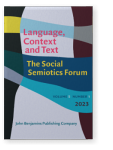Vol. 5:1 (2023) ► pp.124–160
A trinocular view of the auxiliary verb will in COVID-19 briefings from Westminster and Holyrood
This corpus assisted investigation of the auxiliary verb will examines the various modalities and functions realised in the register of political briefings given by Scottish (Holyrood) and United Kingdom (Westminster) representatives throughout the first year of the coronavirus pandemic.
A trinocular approach is taken to consider the lexicogrammatical environment of will (from around), the discourse semantics of will (from above) and the relationship between contraction and meaning (from below).
Our trinocular approach with a focus on will as a highly frequent item with great meaning potential has enabled us to gain insights about the nature of how politicians used modality to persuade, organise and empathise within coronavirus media briefings and thus shape their public personas as leaders.
Article outline
- 1.Introduction
- 2.Review of previous research
- 2.1Crisis communications, leadership and strategies of engagement
- 2.2 Will as a modal auxiliary
- 2.3Personal pronouns preceding will
- 2.4Research questions
- 3.Data and methodology
- 3.1Texts of briefings
- 3.2Methodology
- 4.Results: Lexicogrammatical features of will
- 4.1Pronouns preceding will
- 4.2Inclusive and exclusive We will
- 4.3You will
- 4.4 I will
- 4.5Summary
- 5.Functions of will in discourse
- 5.1Functions of we will in discourse
- 5.2Functions of you will in discourse
- 5.3Functions of I will in discourse
- 5.4Summary
- 6.The relationship between contraction and meaning
- 7.Discussion
- 8.Summary and conclusions
- Notes
-
References
